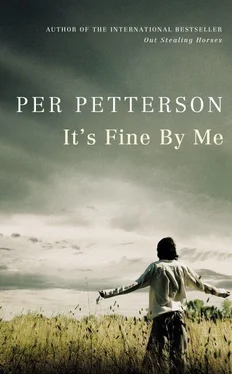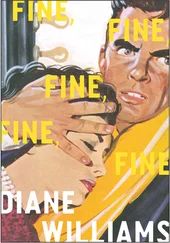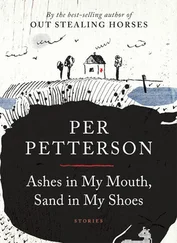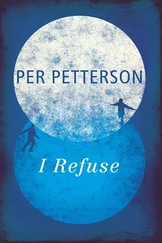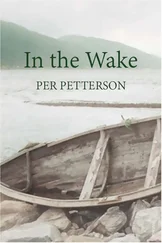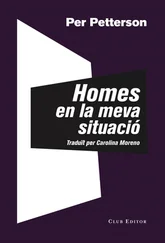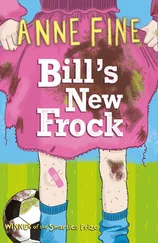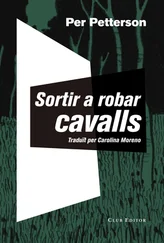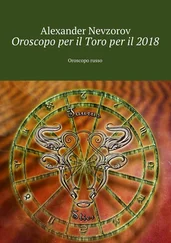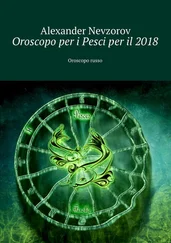I can’t go home like this. My mother will be hysterical and start fussing and ask me all kinds of questions. I don’t think I can face it. I hold the bag close to my chest and spit. There is a red spot on the asphalt. I put my hand to my mouth, and I can feel how my upper lip is split. I need help for this. Very slowly I walk round the shopping centre, past the rear entrance to Geir’s bar and down past the youth club and the post office. If I keep my back straight, my chest doesn’t hurt so much.
‘Anything comes up, you know where I live,’ old Abrahamsen said. He lives at the far end of Veitvetsvingen in a three-room terraced house. I take him at his word. I don’t know where else to go. I could go to Arvid’s, but I have hardly seen him the last month, and I would feel awkward.
I come to the bend in the road. There are cars parked the whole way down. People have more cars than they used to. I cough as gently as I can and ring the bell of the last house. When the bell stops ringing, it is dead quiet. I turn to see if anyone is standing there gawping, but there is no one about. I have two holes in my trousers, one on each knee, and there’s only one button left on my jacket. A noise comes from behind the door, and then it opens and old Abrahamsen peers out. He’s in his underwear. Of course he is, it’s late. I check my watch, but it’s broken and stopped at ten to twelve.
‘I’ll be damned, it’s that boy.’ He smiles. I try to smile back, but I cannot: moving my lips hurts too much. He opens the door and the light streams out from the hall. I close my eyes.
‘For fuck’s sake, Audun, what’s this you look like? Get yourself in here.’ I squint and try, but I can’t move my left leg up his steps. It has gone all stiff. He comes outside and supports my arm, and I limp indoors. I have never been to his place before. I had pictured an old man’s flat with an oilcloth on the table, elks in the sunset, discoloured wall lamps and unwashed, brown coffee mugs. But the walls are freshly painted and covered with framed pictures and photographs and the kitchen is spotless. In the living room there are several paintings and two bookshelves, and there is a zebra skin hanging on the longest wall. There is not one picture of anything in Norway. He sees what I am looking at and says:
‘I was a seaman. You didn’t know, did you? Can you manage to take your clothes off?’ I nod. I can if I have to.
‘You need to take a shower to see what’s what.’ I nod again and start to undress. The jacket and the shirt I can do, but I can’t do the trousers, it feels like my ribs crack when I bend down. I look at him and shrug and shake my head.
‘If it’s fine with you, I can do it,’ he says, and I nod. It’s fine with me. And old Abrahamsen kneels down and pulls off my jeans and boots. His hair has gone grey, but it’s all there, the sinewy arms in the vest work at my laces, he is quick and his muscles ripple, it looks good, and I think: to look like that when you’re past sixty.
He pushes me gently towards the bathroom. I stop him, I want to tell him something, but it’s too difficult, it turns to mush in my mouth, and I make a sign with my hand. He goes to fetch paper and a pencil. I write: ‘Could you please call my mother and tell her not to worry?’ And I add the telephone number.
‘I’ll sort that out, Audun. You take that shower.’
I do. The water is lukewarm and pleasant. It runs red down my stomach and on to the white, painted cement floor, like a rusty snake coiling, and then tapers down the drain. Carefully I dry myself and look into the mirror. Jesus Christ.
He knocks on the door and comes in with plasters and iodine in a little bottle. He stands watching me, shaking his head.
‘How do you feel?’ he says.
‘It hurts.’
‘A lot?’
I nod. He opens the bottle, cleans the wounds with some cotton wool and puts on the plasters. I stand quite still with my eyes closed. Once, by mistake, his elbow touches my ribs. I groan. He presses his finger softly in a few places. I groan again.
‘A couple of broken ribs would be my guess,’ he says, ‘it hurts, but it’s no disaster. Well, this is as much as I can do. I’m not sure about your lip, though. You’ll need to go to casualty with that.’ He tilts his head and smiles.
‘I remember one time I looked a bit like you do now. I was about your age too. It was in Hull, that was, a few years after the First World War. I had signed on a freight vessel. A Dane beat me up, I didn’t stand a chance. He was two metres of muscle from Hirtshals. We became friends later on. We’d had a pint too many, that’s all. You know, I could tell you some things about Hull. It was a great place. Not many people liked it, but I did. And here’s me telling stories. You need some clothes.’
He goes out and rummages around in a wardrobe and returns with a worn, grey suit, measures me up with one eye pinched and helps me on with the trousers. The suit fits and feels good. It’s clean.
‘That’s it, you have to look presentable in casualty, otherwise they won’t treat you properly.’ He rings for a taxi and puts on a jumper, jacket and shoes. He is going with me.
In the taxi down Trondhjemsveien, I huddle in the corner of the back seat. I feel better now, the engine hums and ticks over like a taxi should. I could have gone to sleep had it not been for my aching mouth and chest. I close my eyes and then old Abrahamsen says:
‘I don’t have to tell you, Audun, you know for yourself. You’re eighteen years old. It’s a tricky time. There’s so much going on, and later some say it was the best time they ever had, and some say it was the worst, and they’re both right. People live different lives. People are different. Some get the cream, always, oh, I’ve seen them. But one thing is certain: at some point everything changes. You’re not eighteen all your life. That may not be much of a consolation, but take a hint from someone who’s on the outside looking in: you’ll get through this. I’m dead sure.’
The doctor is tired and irritable. The first thing he says:
‘Is this your doing?’ looking old Abrahamsen in the eye.
‘Thanks for the compliment. Could I have done all that to such a strong fellow without a single scratch in return? Thank you very much!’ He bows, and the doctor is even more irritable. He tells me to get on the table, where I lie flat and he shines a lamp in my face and leans over me. There are black rings under his eyes and he needs a shave.
‘Right,’ he says, ‘you have a choice. I can either stitch you up without an anaesthetic and it will heal just fine, or you can have an injection, and you’ll look into the mirror three weeks from now wondering where you got the hare lip.’ He talks like James Cagney, if Cagney had spoken Norwegian, there is a touch of American movie about the room, and it isn’t much of a choice.
‘No anaethedic,’ I say.
When he has finished he puts a big plaster over the cut, giving me a snub nose, he winds a bandage round my chest, and to his back I say ‘Thank you very much’.
‘OK, next,’ he shouts through the door, and we go down the corridor, past reception and on through the double doors to the square in front and look for a taxi. I am dizzy with fatigue and pain, and in the car I say the only right thing.
‘Tell me bou Hull.’
Old Abrahamsen smiles and tells me about Hull. About sailing down the Humber past fishing boats bow to stern all the way from Grimsby, and the old paddle steamer carrying passengers to and fro across the Humber and the old wooden wharves that must be long gone by now, but they smelt of fish and tar, reeking of a hundred years of sweat and toil when the sun was out, and quiet Sundays in Pearson Park where old men in white shirts and braces played bowls in the shade under the trees, the measured strides of men past seventy and the far-off clicks when the wooden bowls collided. It was so quiet you could hear your watch tick and your heart beat. And old Abrahamsen was young and lay on the grass kissing Mona O’Finley from Dublin. Her father had fled Ireland after 1916 and settled in 14 Pendrill Street, a grey house in a row of grey houses, off Beverley Road heading east. Oh, he liked Hull all right, there was not much of an upper class there, and on some days all you could hear around the harbour was Danish and Norwegian. And if talking to your neighbours was not what you fancied, you could go and have a pint at the Polar Bear, the finest pub in the world, where men in faded blue clothes were discussing trade union politics and poetry.
Читать дальше
